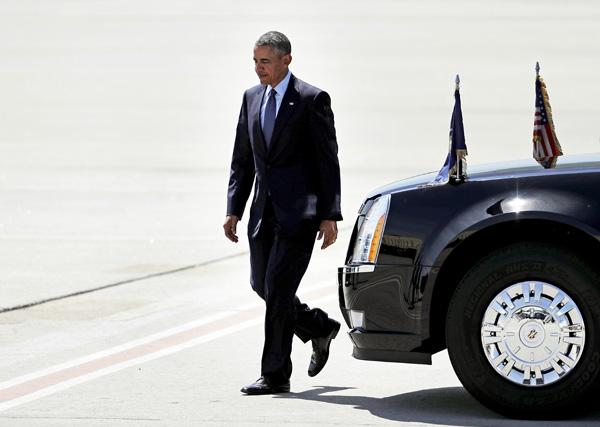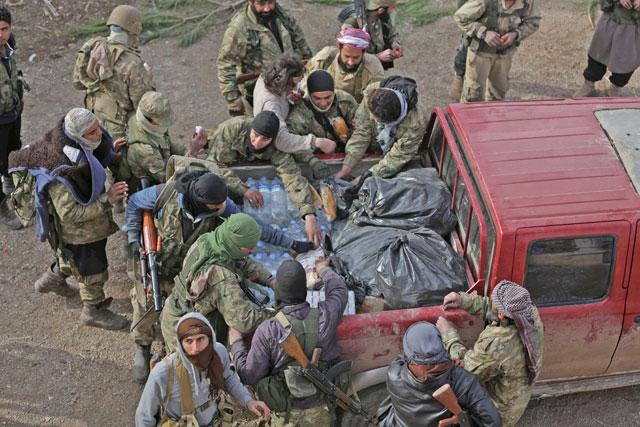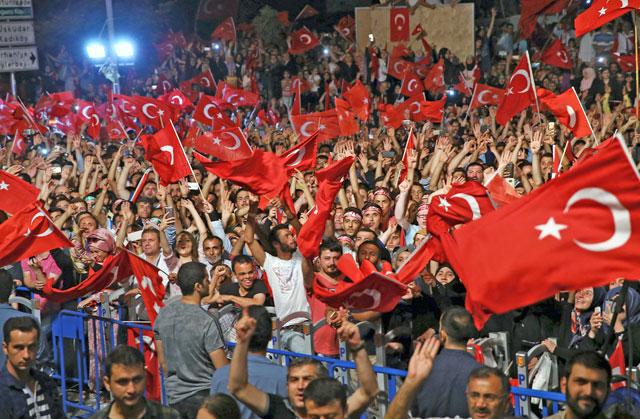You are here
Obama to hold informal talks with Erdogan as ties show strain
By Reuters - Mar 29,2016 - Last updated at Mar 29,2016

President Barack Obama walks over to shake hands with guests on the tarmac after arriving on Air Force One at Hartsfield-Jackson Atlanta International Airport on Tuesday (AP photo)
ISTANBUL/ABOARD AIR FORCE ONE — President Barack Obama will hold informal talks with Turkish President Recep Tayyip Erdogan in Washington this week, the White House said on Tuesday, dismissing suggestions that the lack of a formal meeting represented a snub to Ankara.
Erdogan will be among more than 50 world leaders attending a Nuclear Security Summit in Washington on Thursday and Friday, during which time he is due to have a formal meeting with Vice President Joe Biden.
There had been intense speculation in the Turkish media over whether Obama would meet Erdogan, with some suggesting a failure to do so would mark a deliberate US snub amid differences over Syria and Washington's concerns over the direction of Turkey's domestic policies.
At a news conference in Istanbul before leaving for the United States earlier on Tuesday, Erdogan said a meeting with Obama at the nuclear summit was planned, although he said he did not know how long it would last.
Biden's office later said the vice president would host Erdogan for a meeting on Thursday in Washington.
"I would expect that over the course of the visit, the president will have an opportunity at some point to have at least an informal discussion with President Erdogan," White House spokesman Josh Earnest told reporters traveling with Obama.
Earnest said the lack of a formal meeting should not be interpreted as a snub, noting Biden's planned meeting with Erdogan as well as the large number of foreign leaders due to attend the summit.
"There obviously is a lot of important work to do with our allies in Turkey ... It also includes continuing to intensify our coordination on key aspects of our counter-ISIL [counter-Daesh] strategy, including ramped-up efforts to secure the Turkey-Syria border," he said.
Turkey, a NATO member, is part of the US-led coalition fighting the Daesh terror group in Syria and Iraq.
Though allies, Washington and Ankara are sharply divided over a Kurdish militia in northern Syria. The militia has enjoyed US military support but Turkey, which has a large ethnic Kurdish minority in its conflict-riven southeast region, sees it as a threat to its own national security.
One US official, speaking on condition of anonymity, acknowledged there were strains between the United States and Turkey on a range of issues, but added that Washington regards Ankara's assistance as essential to fighting Daesh.
The United States has also grown increasingly critical of Turkey's record on freedom of expression. Biden said during a visit in January that Turkey was setting a poor example in intimidating media and accusing academics of treason.
Erdogan, meanwhile, said on Tuesday he wanted US authorities to take steps against a network of schools run by a movement affiliated with Islamic preacher Fethullah Gulen, a US-based Turkish cleric whom he has accused of running a "parallel" state and of plotting to overthrow him.
Gulen, whose network of followers runs schools worldwide, was once an ally of Erdogan. But the two publicly fell out after police and prosecutors Erdogan saw as sympathetic to Gulen launched a graft investigation that touched on the Turkish leader's inner circle in 2013.
Gulen, who faces terrorism charges in Turkey, denies that his followers sought to topple Erdogan.
Erdogan has said the arrest last week in Florida of a Turkish-Iranian gold trader who was at the centre of that graft investigation is not a concern for Turkey.
"The real money launderers are there [in the United States]. Have the authorities taken any steps towards them?" Erdogan said, in reference to Gulen's network.
Related Articles
ANKARA — New CIA chief Mike Pompeo arrived in Ankara on Thursday for talks with Turkish officials, on his first foreign visit since the inau
ISTANBUL — Turkish authorities have prepared an official request for the temporary arrest of United States-based Islamic cleric Fethullah Gu
ISTANBUL/ANKARA — Turkey vowed to root out allies of the US-based cleric it blames for an abortive coup last week, widening a purge of the a



















